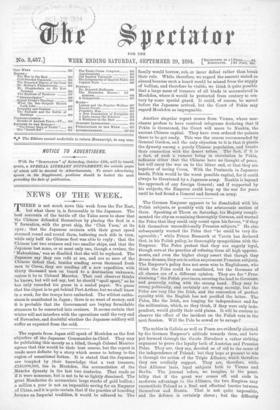The German Emperor appears to be dissatisfied with his Polish
subjects, or possibly with the aristocratic section of them. Speaking at Thorn on Saturday, his Majesty compli- mented the city on remaining thoroughly German, and warned the Poles that they could only count upon his favour, "if they felt themselves unconditionally Prussian subjects." He also subsequently warned the Poles that "he could be very dis- agreeable ; " while Prince Bismarck at Varzin has declared that, in his Polish policy, he thoroughly sympathises with the Emperor. The Poles protest that they are eagerly loyal, though sore at the practice of refusing them all high appoint- ments, and even the higher clergy assert that though they dream dreams, they are in action acquiescent Prussian subjects. The Emperor's policy does not seem wise to Englishmen, who think the Poles could be conciliated, but the Germans of all classes are of a different opinion. They are for " Prue- sianising " the Polish provinces, securing the land to Germans, and generally ruling with the strong hand. They may be wrong politically, and certainly are wrong morally, but the Poles are very like the Irish, and the concession of perfect equality with the English has not pacified the latter. The Poles, like the Irish, are longing for independence and for the millennium, which, as they think, if they were only inde- pendent, would glorify their cold plains. It will be curious to observe the effect of the incident on the Polish vote in the next Session. Will the Pole be cowed or be savage ?






































